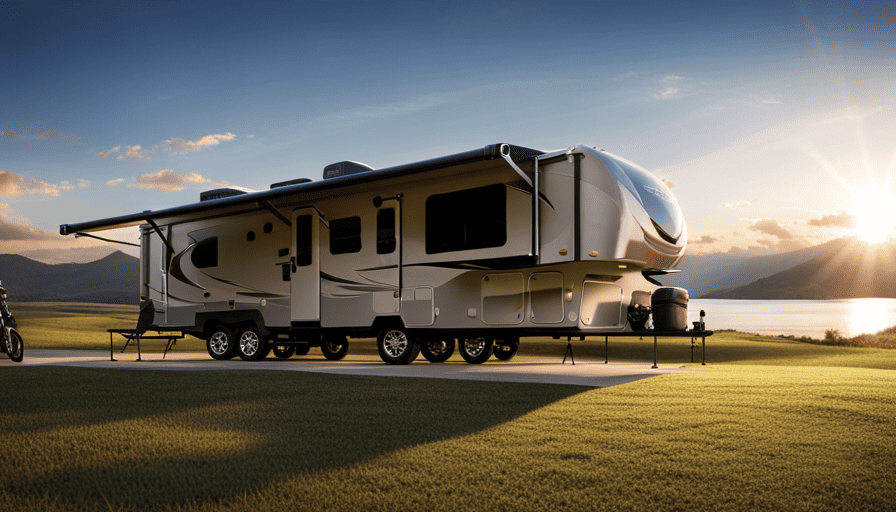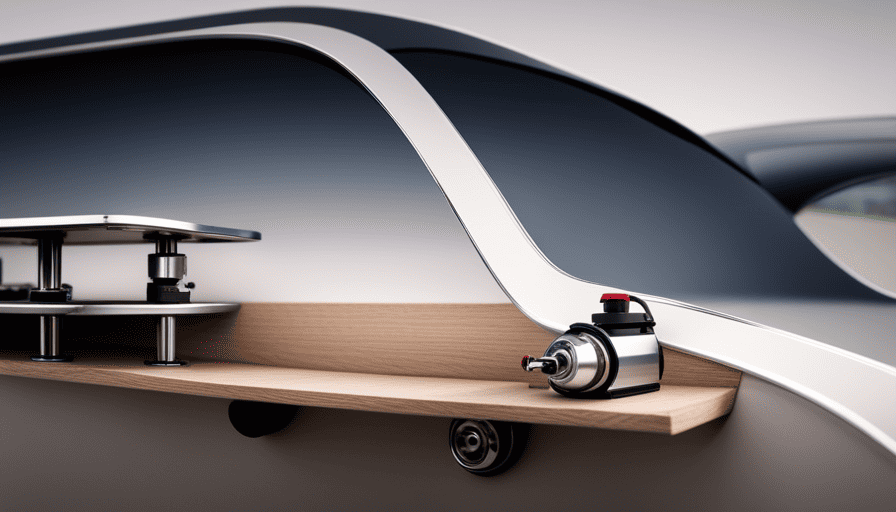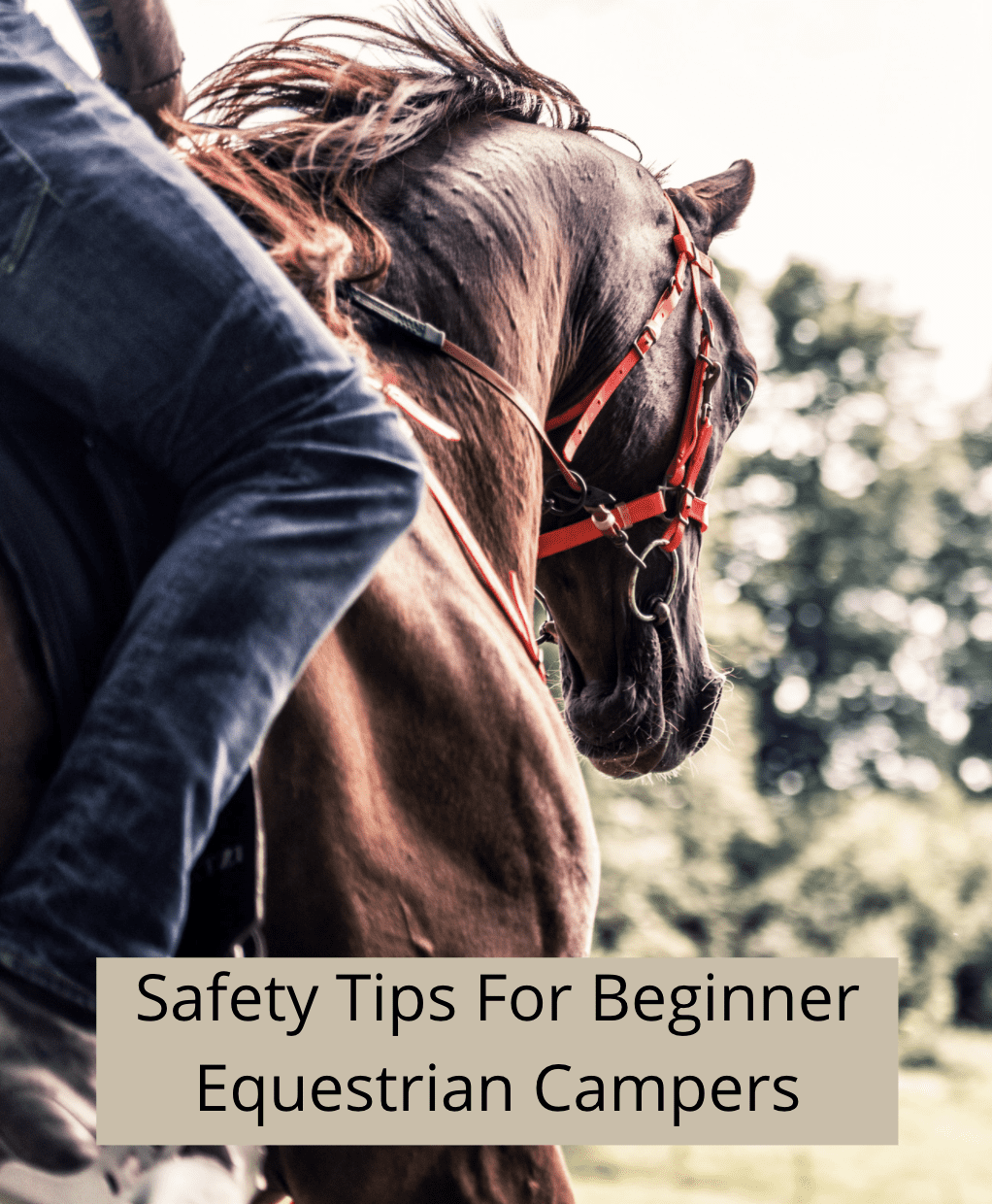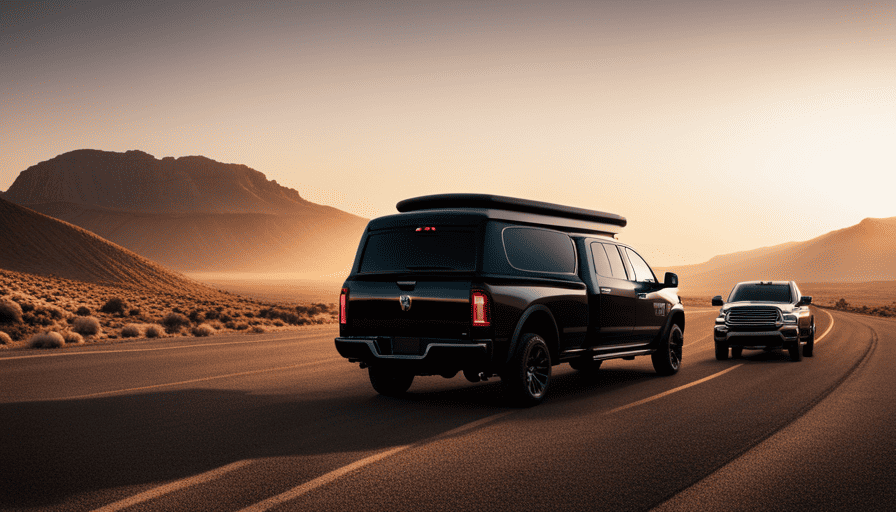Have you ever pondered the actual length of a 5th wheel camper?
Well, let me tell you, the answer may surprise you! As an avid camper and RV enthusiast, I can confidently say that 5th wheel campers come in a variety of lengths, ranging from around 25 feet all the way up to a whopping 45 feet! That’s right, these incredible recreational vehicles can be as long as some small houses.
But why does length matter when it comes to choosing the right camper for your needs?
Well, in this article, we will explore the basics of 5th wheel camper length, including common lengths, factors that affect length, and how to find the perfect balance between length and living space.
So, whether you’re a seasoned camper or a newbie looking to hit the road, join me as we dive into the fascinating world of 5th wheel campers and discover just how long they can be.
Key Takeaways
- 5th wheel campers come in lengths ranging from around 25 feet to 45 feet, with common lengths ranging from 25 to 40 feet.
- The length of a 5th wheel camper affects maneuverability, parking options, and the amount of living space and storage available.
- Shorter campers are easier to maneuver, more fuel efficient, and generally less expensive, while longer campers offer more living space and storage but may require more powerful trucks for towing.
- Factors to consider when choosing the length of a 5th wheel camper include towing capacity, parking restrictions, desired living space, and the number of people traveling.
Understanding 5th Wheel Campers
Do you ever wonder how spacious and comfortable a 5th wheel camper can be? Well, let me tell you, these campers are a dream come true for anyone looking for a home away from home on wheels.
One of the key factors that contribute to the impressive amount of space in a 5th wheel camper is its RV weight distribution. Unlike traditional travel trailers, which are towed by a hitch on the back of a vehicle, 5th wheel campers are attached to a special hitch located in the bed of a pickup truck. This unique setup allows for a more even weight distribution between the truck and the camper, resulting in a more stable and comfortable ride.
Another important aspect to consider when it comes to the spaciousness of a 5th wheel camper is its interior layout. These campers are designed with efficiency and functionality in mind, making the most of every inch of available space. From the moment you step inside, you’ll be amazed at how well the different areas flow together. The living area seamlessly transitions into the kitchen and dining area, creating an open and inviting space. The bedroom is usually located in the front part of the camper, providing a private and cozy retreat. And let’s not forget about the bathroom, which is often equipped with all the amenities you’d find in a traditional home.
Now that we’ve explored the spaciousness and comfort of a 5th wheel camper, it’s time to dive into the basics of RV length.
The Basics of RV Length
Imagine yourself driving down the road with your own little slice of paradise in tow, a cozy home on wheels that effortlessly glides behind you, creating a sense of freedom and adventure that can only be found in an RV. When it comes to RV length and weight, it’s important to understand the basics.
RVs come in various sizes, but for the purpose of this discussion, let’s focus on 5th wheel campers. These campers are known for their unique towing style, as they attach to the bed of a pickup truck.
Here are the pros and cons of shorter vs. longer 5th wheel campers:
Shorter Campers:
- Easier to maneuver and park in tight spots
- Better fuel efficiency
- Generally less expensive
Longer Campers:
- More living space and storage
- Can accommodate larger families or groups
- May require more powerful trucks for towing
It’s essential to consider your specific needs and preferences when choosing the length of your 5th wheel camper. With this understanding, let’s delve into the common lengths of 5th wheel campers and explore their unique features and benefits.
Common Lengths of 5th Wheel Campers
Let’s now explore the popular sizes of 5th wheel campers and discover their distinctive features and advantages.
When it comes to 5th wheel campers, they come in a variety of lengths to suit different needs and preferences. The most common lengths range from 25 to 40 feet, with each size offering its own set of benefits.
Starting with the smaller end of the spectrum, a 25-foot 5th wheel camper is compact and easy to maneuver. It’s perfect for those who prefer a smaller, more agile camper that can fit into tighter camping spots. On the other hand, a 40-foot camper provides ample living space and storage, making it ideal for those who want all the comforts of home while on the road.
When comparing RV sizes, longer campers have their pros and cons. While they offer more living space and storage, they can be more challenging to tow and maneuver. Additionally, longer campers may have restrictions on where they can be parked or camped due to their size.
The size of a 5th wheel camper can vary significantly, and each length offers its own advantages. Whether you prefer a smaller, more maneuverable camper or a larger one with all the amenities, there’s a size that’s perfect for you.
Now let’s dive into the factors that affect 5th wheel camper length.
Factors that Affect 5th Wheel Camper Length
To determine the ideal size for your 5th wheel camper, consider factors such as towing capacity, parking restrictions, and desired living space. These factors can greatly affect the length of your camper and ultimately impact your overall camping experience. When it comes to towing capacity, it is important to ensure that your vehicle can safely tow the weight of the camper. This will help prevent any potential accidents or damage to your vehicle. Additionally, parking restrictions play a significant role in determining the size of your camper. If you plan on traveling to campsites or RV parks with limited space, a smaller camper may be more suitable. On the other hand, if you prioritize spacious living quarters, a longer camper can provide you with more comfort and amenities. Longer campers often offer additional sleeping areas, larger bathrooms, and increased storage space. Ultimately, the size of your 5th wheel camper should be based on your individual needs and preferences. By carefully considering these factors, you can choose the right size for your needs and ensure a memorable camping experience.
Choosing the Right Size for Your Needs
When deciding on the perfect size for your needs, picture yourself in a spacious and luxurious rolling palace on wheels that offers all the comforts of home. The size of your fifth wheel camper is an important factor to consider as it will determine the amount of living space you have and the amenities you can enjoy while on the road.
To help you choose the right size, here are three key considerations:
-
RV size comparison: Take into account the number of people who will be traveling with you and the amount of time you plan to spend in the camper. If you have a larger family or plan to go on extended trips, a larger fifth wheel camper with multiple bedrooms and a spacious living area may be the best choice. On the other hand, if you are a solo traveler or a couple, a smaller and more compact camper may be more suitable.
-
Best brands for different needs: Research different brands and models to find the ones that offer the best layout and features for your specific needs. Some popular brands known for their quality and variety of sizes include Forest River, Jayco, and Keystone.
-
Maneuverability and parking considerations: Keep in mind that larger fifth wheel campers can be more challenging to maneuver and park. If you plan to travel to remote or tight spaces, a smaller camper may be easier to handle. However, if you prioritize space and comfort over ease of maneuverability, a larger camper can still be a great choice with proper planning and practice.
Choosing the right size for your fifth wheel camper is crucial for a comfortable and enjoyable experience on the road. Next, let’s discuss maneuverability and parking considerations to help you further narrow down your options.
Maneuverability and Parking Considerations
Navigating tight spaces and finding the perfect parking spot can be a nerve-wracking experience, but with careful consideration of maneuverability, you can confidently hit the road in your dream mobile haven.
When it comes to fifth wheel campers, maneuverability challenges can arise due to their larger size compared to other RVs. These campers typically range from 25 to 40 feet in length, which can make it challenging to navigate through narrow streets or tight campground spaces. Additionally, parking restrictions can limit your options when it comes to finding suitable spots for your fifth wheel.
Some campsites may have length restrictions or limited spaces for larger RVs, making it important to plan ahead and research campgrounds that can accommodate your specific needs. However, don’t let these challenges discourage you. With a bit of patience and practice, maneuvering a fifth wheel becomes easier over time.
In the next section, we will explore the balance between length and living space, helping you make informed decisions when choosing the right size for your needs.
Length vs. Living Space: Finding the Balance
Balancing the size of your mobile haven and the available living space can be a delicate task, requiring careful consideration. When it comes to a 5th wheel camper, finding the right balance between size and comfort is crucial. While a longer camper may offer more living space, it can also present challenges in terms of maneuverability and parking.
When considering the layout and design of a 5th wheel camper, it’s important to think about how you will use the space. Look for floor plans that maximize the living area without sacrificing functionality. Consider features like slide-outs, which can expand the living space when parked, but can also add weight and reduce maneuverability when on the road.
Another factor to consider is the overall length of the camper. Longer campers may provide more room, but they can also be more difficult to tow and maneuver. It’s important to have a tow vehicle with the appropriate towing capacity and to practice safe driving techniques when maneuvering a longer camper.
Finding the right balance between size and comfort is key when choosing a 5th wheel camper. By considering the layout and design, as well as the overall length of the camper, you can ensure that your mobile haven provides both the space and maneuverability you need.
Now, let’s move on to some tips for towing and maneuvering longer campers.
Tips for Towing and Maneuvering Longer Campers
To optimize your towing and maneuvering experience with larger recreational vehicles, it’s essential to implement expert tips and techniques. When it comes to towing a longer camper, there are a few key factors to consider.
First and foremost, make sure your tow vehicle is capable of handling the weight and length of the camper. Check the manufacturer’s recommendations and ensure that you have the appropriate towing capacity.
Additionally, it’s crucial to distribute the weight evenly throughout the camper to maintain stability on the road. This can be achieved by properly loading your belongings and using weight distribution hitches if necessary.
Safety precautions should always be a top priority when towing a fifth-wheel camper. Be sure to check your tires regularly and inflate them to the recommended pressure. It’s also important to double-check all the connections and ensure that they are secure before hitting the road.
When maneuvering your camper, take wider turns to accommodate the longer length and always use your side mirrors to check for any obstacles. Consider practicing in an open space or empty parking lot to get a feel for how your camper responds to turns and backing up.
By following these towing techniques and safety precautions, you can have a smoother and more enjoyable experience with your longer camper. Now, let’s delve into the next section about storage and maintenance considerations.
Storage and Maintenance Considerations
When it comes to taking care of your recreational vehicle, it’s important to keep in mind the storage and maintenance considerations that will ensure its longevity and optimal performance. Here are some key points to consider:
-
Storage options: Finding the right storage solution for your 5th wheel camper is essential. Whether it’s storing it at a facility or keeping it on your property, make sure it’s in a secure and protected environment. Consider factors like weather conditions, accessibility, and available space.
-
Maintenance schedule: Regular maintenance is crucial for keeping your 5th wheel camper in top shape. Create a maintenance schedule that includes tasks like checking the tires, inspecting the roof for leaks, lubricating moving parts, and cleaning the exterior and interior. Following a routine will help prevent issues and extend the lifespan of your camper.
-
Winterizing: If you live in an area with cold winters, proper winterization is crucial. This includes draining the water system, adding antifreeze, and protecting exposed pipes. Taking these steps will prevent freezing and potential damage.
-
Cleaning and detailing: Keeping your 5th wheel camper clean is not only aesthetically pleasing but also important for its maintenance. Regularly clean the interior and exterior, remove any debris, and consider professional detailing to keep it looking its best.
-
Insurance coverage: Lastly, make sure your camper is properly insured. This will provide financial protection in case of accidents, theft, or damage.
Taking care of your 5th wheel camper involves considering storage options and following a maintenance schedule. By following these steps, you’ll ensure the longevity and optimal performance of your camper.
Now, let’s move on to some final thoughts on 5th wheel camper length.
Final Thoughts on 5th Wheel Camper Length
In a nutshell, finding the right size for your 5th wheel camper is like finding a needle in a haystack – it’s all about striking the perfect match between your towing vehicle and the camper’s dimensions. When it comes to the length of a 5th wheel camper, there are several factors to consider, including maneuverability concerns and finding the right balance between space and ease of towing.
To help you make an informed decision, let’s take a look at a table that compares the length of different 5th wheel campers and their corresponding benefits and considerations:
| Camper Length | Benefits | Considerations |
|---|---|---|
| Shorter | Easier to maneuver and park | Less living space |
| Longer | More living space | Harder to maneuver and park |
As you can see, there is a trade-off between maneuverability and living space when it comes to the length of a 5th wheel camper. If you prioritize easy maneuverability, opting for a shorter camper would be the way to go. On the other hand, if you value more living space, a longer camper would be a better choice.
Finding the right balance is crucial to ensure a comfortable and enjoyable camping experience. Consider the size of your towing vehicle, your experience level in towing, and the type of camping trips you plan to take. By taking these factors into account, you can find the perfect length for your 5th wheel camper that meets your needs and enhances your adventures on the road.
Frequently Asked Questions
How much does a 5th wheel camper weigh?
A 5th wheel camper can weigh anywhere from 12,000 to 20,000 pounds, depending on its size and features.
The weight of the camper is an important consideration when determining the towing capacity of your vehicle. It’s crucial to ensure that your vehicle is capable of safely towing the weight of the camper.
Always consult your vehicle’s owner’s manual or a professional to determine the appropriate towing capacity for your specific setup.
Can a 5th wheel camper be towed by a regular pickup truck?
Towing a 5th wheel camper with a regular pickup truck is definitely possible, my friend. However, it’s crucial to consider the towing capacity of your truck.
The weight of the camper, along with the weight of any cargo you’re carrying, should not exceed the truck’s towing capacity. Additionally, you’ll need a special hitch installed in the bed of your truck, called a fifth wheel hitch.
So, make sure your pickup truck meets the towing requirements before hitting the road with your 5th wheel camper!
Are there any size restrictions for parking a 5th wheel camper in RV parks?
There are indeed size restrictions and parking regulations for 5th wheel campers in RV parks. Each park may have its own specific guidelines, but generally, they set limits on the length, width, and height of the camper.
These restrictions ensure that the campers can fit into designated spaces and allow for proper maneuverability within the park. It’s important to check with the specific RV park you plan to visit to ensure your 5th wheel camper meets their size requirements.
What are the advantages of a longer 5th wheel camper?
When it comes to a longer 5th wheel camper, the advantages are truly impressive.
Picture this: you’ll have ample space for all your belongings, making it feel like a luxurious home on wheels.
A longer camper also means more room to entertain guests or relax after a long day of adventuring.
Additionally, you can have larger kitchen and bathroom areas, giving you the convenience and comfort you deserve.
In short, a longer 5th wheel camper opens up a world of possibilities and enhances your overall RV experience.
How often should a 5th wheel camper be serviced and maintained?
Regular maintenance is crucial for the optimal performance and longevity of a 5th wheel camper. It is recommended to service and maintain your camper at least once a year, or every 12,000 miles, whichever comes first.
This includes checking and lubricating the wheel bearings, inspecting and replacing the brakes if necessary, checking and cleaning the roof and exterior, inspecting the tires, and ensuring all systems are in proper working order.
Regular maintenance helps prevent costly repairs and ensures a safe and enjoyable camping experience.
Are Camper Vans Longer Than 5th Wheel Campers?
Camper vans and 5th wheel campers differ in size, with the length of a camper van typically being shorter than that of a 5th wheel camper. While camper vans range from around 15 to 25 feet long, 5th wheel campers can measure from 20 to 40 feet in length. The varying lengths cater to different preferences and needs of travelers seeking recreational vehicles for their journeys.
Conclusion
After diving deep into the world of 5th wheel campers and exploring their various lengths, it’s clear that size does matter.
From understanding the basics of RV length to considering factors that affect 5th wheel camper size, it’s crucial to choose the right fit for your needs.
However, in the ironic twist of fate, it seems that the longer the camper, the more challenges arise in terms of towing, maneuvering, and storage. So, while a larger camper may offer more living space, it also comes with its fair share of headaches.
Ultimately, finding the balance between length and living space is key.
Happy camping!










